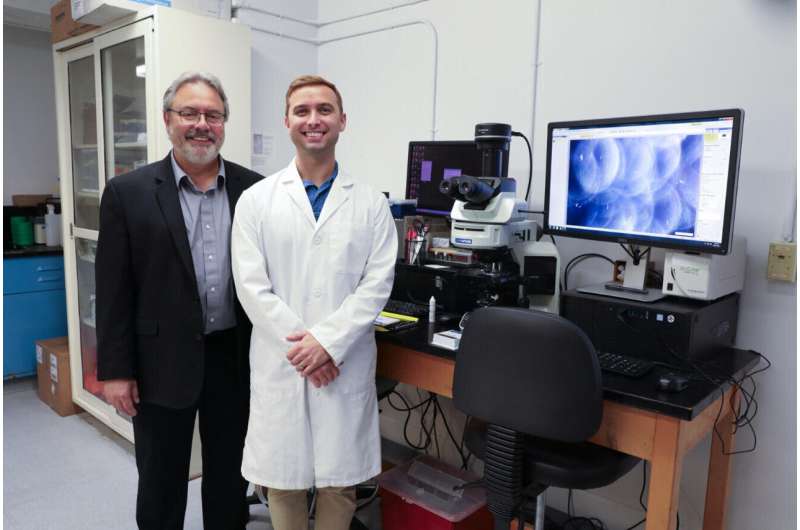This article has been reviewed according to Science X's editorial process and policies. Editors have highlighted the following attributes while ensuring the content's credibility:
fact-checked
trusted source
proofread
'Diagnose, treat and prevent:' Scientists develop test and vaccine for common veterinary infection

Eight years after the market release of VANGUARD crLyme, a first-of-its-kind vaccine designed to prevent Lyme disease in dogs, the Marconi laboratory in the Department of Microbiology and Immunology of the Virginia Commonwealth University School of Medicine is on the precipice of completing another medical innovation.
Project leaders Richard T. Marconi, Ph.D., and Edward Schuler, Ph.D., are in the final stages of developing new diagnostic tests and a vaccine for leptospirosis. Commonly referred to as "lepto," leptospirosis is a widespread and potentially deadly zoonotic infection caused by the bacteria Leptospira.
It is spread through contact with urine from an infected animal, most often through contaminated water, soil or food. While dogs, horses, cattle and pigs have the greatest infection risk, the CDC reports that there are nearly 1 million cases of leptospirosis in humans worldwide each year, with nearly 60,000 deaths.
"Of all the zoonotic infections we hear about, lepto is by far the worst," said Marconi, the principal investigator on this project. "It can take a massive toll on both the public health and the global health economy in terms of food production and pricing. To be able to diagnose it, treat it and prevent it are all incredibly important."
Researchers are finalizing both a laboratory-based test and a point-of-care test, similar to a rapid COVID-19 or pregnancy test, for leptospirosis. They are also working on a new vaccine for the disease.
'Lepto is everywhere'
In October 2023, the American College of Veterinary Internal Medicine recommended that every dog in the U.S. be vaccinated for leptospirosis. This development provided further motivation to bring new products to the market, especially for Schuler, who grew up admiring his mother's work as a veterinary technician.
"Lepto is everywhere," Schuler said. "You should be able to take your dog out swimming or for a run in a field and not have to wonder if there's lepto in the water and if your dog is going to go into kidney failure next week and possibly even transfer the infection to you."
Leptospirosis may occur in two phases, starting with fever, chills, headache, muscle aches, vomiting or diarrhea. Due to the symptoms' similarities with other diseases, leptospirosis often goes undiagnosed. This can lead to a more severe phase, which includes kidney or liver failure, or meningitis. Although leptospirosis can be treated with antibiotics, the increased risk of an inaccurate diagnostic test result may prove fatal.
According to Schuler, a major challenge in combating the deadly infection is the unreliability of currently available point-of-care diagnostic tests, which often discourages vet techs from running the test, and confounds timely treatment of the disease. Current tests can pick up antibodies from a previously administered vaccine, which can result in a false positive.
"If we can bring a better test to the market, it'll allow patients and animals to be diagnosed quicker and be treated earlier for greater outcomes," Marconi said.
According to Marconi, the only alternatives to point-of-care diagnostic tests for leptospirosis currently on the market are expensive laboratory tests which can take over a week to provide results.
Furthermore, researchers have found that whether it is a healthy animal with a past exposure or a healthy animal that has already been vaccinated, both can yield a false positive with the current diagnostic. As Schuler noted, the goal is for a more "accurate reading that isn't fooled by the vaccination."
These new tests have been in development for nearly five years. The goal is to push the technology into the commercialization stage and into the hands of clinicians and veterinarians.
"To know that one day veterinarians are going to potentially be purchasing our diagnostic tests to help provide a higher quality of care for pets and pet owners is sort of hard to wrap your head around," Schuler said. "But it's also very exciting."
Provided by Virginia Commonwealth University





















